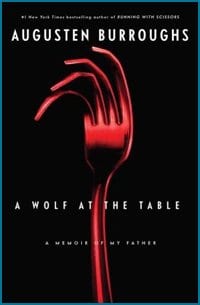Released on the cusp of summer (in a first print-run of 500,000 copies), Augusten Burroughs’ latest book, A Wolf at the Table (St Martin’s $28), may be the oddest popular beach book in recent memory.
Featuring a monstrous villain and a quirky but lovable queer-boy hero, Wolf is as harrowing and mesmerizing as any thriller.
Burroughs’ book is a memoir, though, and its terrors are drawn from the author’s vivid recollection of his tormented childhood.
Subtitled A Memoir of My Father, Burroughs’ book is also a continuance of the author’s own highly public striptease. If we’ve come to know Burroughs as the crazed (but witty) drunk in Dry and the sexually confused teenager living in a bizarre virtual madhouse in Running with Scissors, in Wolf we come to see the earliest episodes in his troubled life — the place where all the troubles began, in other words.
As affecting self-portraiture, Wolf also reveals the adult Burroughs who still struggles with the aftermath of his childhood. In particular, the memoir perfectly illustrates how the absence of a parent’s love or support can have great impact long after childhood has passed.
To call the other focus of the memoir ‘disturbing’ is an understatement. Burroughs’ father was monstrous, no question.
In trying to making sense of that father — a remote and uncommunicative philosophy professor who was also a chronically messy (and argumentative) drunk and a master of the kinds of psychological games serial killers play in bestsellers — Burroughs comes to realize that the man, now dead and buried, will remain a puzzle never to be solved.
In fact, his father’s truly astonishing assortment of weird and disturbing traits will make most readers thankful for the mild and benign excesses of their own fathers.
Burroughs can only conclude that his father’s mind was missing a vital ingredient and that he was not fully human.
For readers, the story of Burroughs’ rebound is hopeful. A recovering alcoholic with a bipolar mother and a psychopathic father, he is living proof of an individual’s surprising resilience and ability to overcome a history of imposing obstacles.

 Why you can trust Xtra
Why you can trust Xtra


